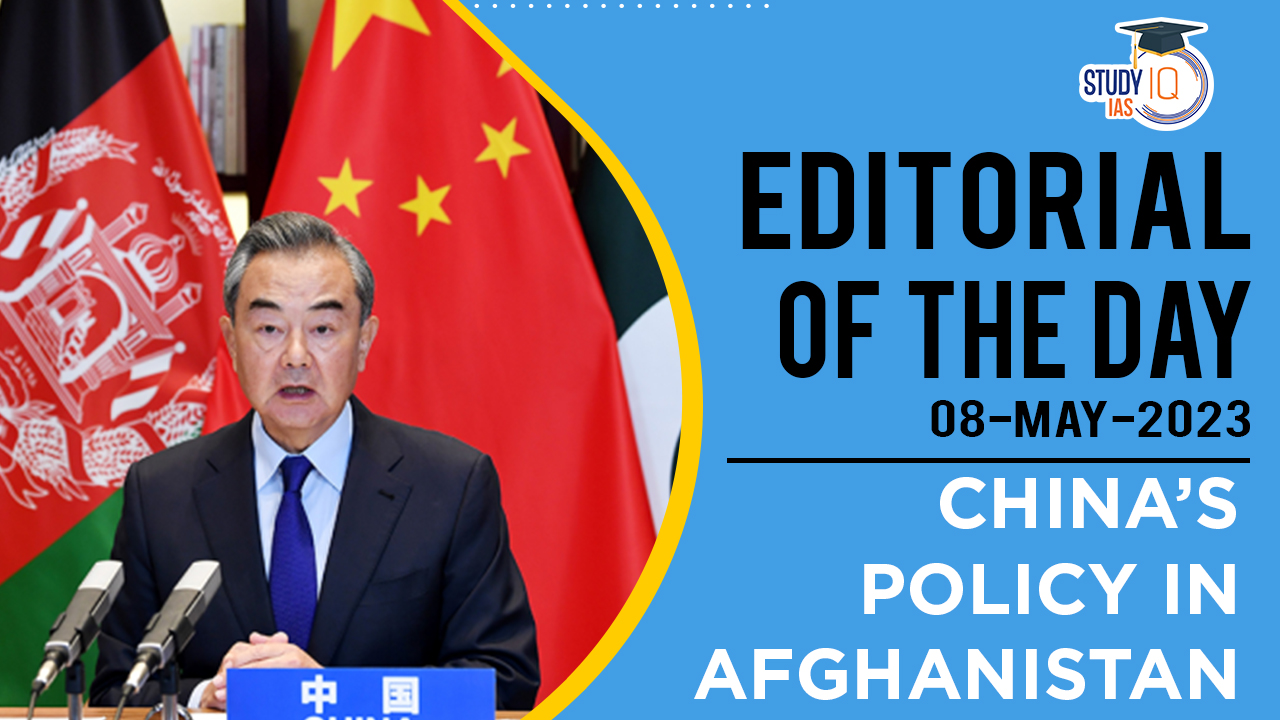Table of Contents
Context: The article is discussing China’s policy towards Afghanistan and its recent efforts to present itself as a responsible global player that can contribute to resolving international issues objectively, without pursuing its own interests, unlike the United States. The article highlights the recently released 11-point paper by China titled ‘China’s position on the Afghan Issue’ that outlines China’s priorities in its engagement with the Taliban in Afghanistan and signals Beijing’s policy towards the crisis-ridden country. It also reflects China’s broader efforts to reshape its image internationally, positioning itself as a responsible global actor.
China’s Policy in Afghanistan Background
The issue of instability in Afghanistan can be traced back to several factors, including political instability, ethnic tensions, and external interference.
- 1979: The Soviet Union invaded Afghanistan and installed a communist government. This triggered a decade-long conflict known as the Soviet-Afghan War, which resulted in the deaths of over a million people and the displacement of millions more.
- 1992-1996: After the Soviet’s withdrawal, Afghanistan descended into a civil war between various factions, including the Taliban, a fundamentalist Islamist group that emerged in 1994.
- 1996-2001: The Taliban gained control of most of Afghanistan and imposed strict Islamic law, including severe restrictions on women’s rights. They also provided a safe haven for terrorist groups, including al-Qaeda, which carried out the 9/11 attacks in the United States in 2001.
- 2001: In response to the 9/11 attacks, the US and its allies invaded Afghanistan and toppled the Taliban government.
- 2001-2021: The US led a coalition of forces in Afghanistan, engaging in counterterrorism operations and attempted to stabilize the country. However, the Taliban continued to carry out attacks and controlled large parts of the country.
- 2021: The US President Joe Biden announced that all US troops will be withdrawn from Afghanistan by September 11, 2021. The Taliban launched a major offensive, capturing large swathes of territory.
- It captured Kabul, the capital of Afghanistan, and declared victory.
- This was followed by the US’s complete withdrawal from Afghanistan ending its 20-year involvement in the country.
China and US’s Policies in Afghanistan
| Aspect | China | US |
| Policy Objectives | Stability, Counter-terrorism, Economic gains | Counter-terrorism, Democracy, Nation-building |
| Military Intervention | No military intervention, prefers regional cooperation | Military intervention with NATO allies |
| Approach to Taliban | Engagement, Acknowledgement as legitimate governing authority | Isolation, Refusal to recognize as legitimate governing authority |
| Use of Sanctions | Opposes unilateral sanctions, Calls for reversal of US sanctions on Afghanistan | Imposes unilateral sanctions on designated individuals and entities |
| Regional Cooperation | Emphasizes regional cooperation, Calls for regional groupings excluding the US and its allies | Primarily relies on NATO allies, Limited regional cooperation |
| Economic Interests | Seeks economic gains, Investments in infrastructure, mineral resources, and Belt and Road Initiative (BRI) | Focus on reconstruction and nation-building, oil and gas resources |
| Humanitarian Aid | Emphasizes providing humanitarian aid, including assistance for refugees | Provides humanitarian aid, including assistance for refugees |
| Perspective | Sees Afghanistan as a potential source of threats to its national security | Sees Afghanistan as a potential source of threats to global security and terrorism |
Decoding the Editorial
China’s Policy towards Afghanistan:
- Three Respects: The article is discussing China’s policy towards Afghanistan that is guided by three core principles, which it refers to as the “Three Respects” and “Three Nevers.” The Three Respects are:
- Respect for Afghanistan’s independence, meaning that China recognizes Afghanistan’s right to determine its own political and economic path without outside interference.
- Respect for Afghanistan’s sovereignty, meaning that China recognizes Afghanistan as a sovereign state with the right to control its own territory and make decisions on behalf of its people.
- Respect for Afghanistan’s territorial integrity, meaning that China recognizes Afghanistan’s borders as fixed and inviolable.
- The Three Nevers: These include:
- China will never interfere in Afghanistan’s internal affairs or impose its own ideology or values on the Afghan people.
- China will never seek to dominate or control Afghanistan.
- China will never use Afghanistan to further its own interests at the expense of the Afghan people.
- Principled Approach:
- China’s policy choices are based on a principled approach that prioritizes respect for Afghan sovereignty and independence, as well as the wishes of the Afghan people, over geopolitical considerations and self-interest.
- It contrasts this approach with what it sees as the West’s more self-interested policies towards Afghanistan.
- China’s View on Afghanistan:
-
- China views Afghanistan as a country in transition from a period of instability under a US-backed government to a new phase of relative stability under the Taliban.
- The paper emphasizes the West’s failure to fulfill its commitments to Afghanistan and its imposition of its own concept of democracy without taking into account the country’s unique characteristics, which China blames for starting the crisis in the first place.
- It also criticizes the US for imposing unilateral sanctions and freezing Afghanistan’s foreign reserves illegally.
-
-
- In response to these actions, China is calling for the reversal of the sanctions and committing to help Afghanistan transition to a more sustainable economy.
- This suggests that China sees itself as a potential partner for Afghanistan in its efforts to rebuild and stabilize the country, in contrast to what it sees as the failures of the West.
-
China’s Advocacy of Alternative Regional Grouping:
- China is advocating for the international community to take a comprehensive, balanced, and objective approach to the Afghan issue, using alternative regional groupings that do not include the US and its allies.
- These groupings include the Shanghai Cooperation Organisation (SCO), the Moscow Format Dialogue, the recent Foreign Ministers’ group that met in Samarkand, and the China-Afghanistan-Pakistan Trilateral Foreign Ministers’ Dialogue.
- By using these alternative groupings, China can promote an alternative model of engagement with Afghanistan that is distinct from what it sees as the “battered approach” of the West.
- This approach would allow China to focus more on its priorities and build a consensus among Afghanistan’s neighbours.
China’s Interests in Afghanistan:
- China is framing its involvement in Afghanistan in purely humanitarian terms, emphasizing good neighborliness and mutual respect for its neighbours, it is also pursuing its own security and economic interests in the country.
- While Beijing is avoiding acknowledging its interests in Afghanistan, it recognizes that stability in the country is crucial for it to attain its own objectives.
- China sees its involvement in Afghanistan as an opportunity to present a counter to US hegemony, both politically and financially.
- The paper argues that the presence of multiple crises and renewed competition in the world has forced China to adopt a proactive approach, with countries urging China to take charge as the US has abdicated its responsibility.
- However, Beijing is downplaying its own interests in Afghanistan to avoid being seen as solely motivated by self-interest and to present itself as a responsible global actor.
- Economic Interest:
-
- Afghanistan is economically very important for China due to its strategic location and vast mineral resources.
- This is significant for China’s Belt and Road Initiative (BRI), which seeks to develop infrastructure and economic ties across Asia, Europe, and Africa.
- As such, the stability and security of Afghanistan are crucial for China’s economic interests in the region.
China’s Concern:
- China views the threat of terrorism emanating from Afghanistan as a very real concern that could harm its interests and personnel.
- As such, Beijing calls for a bilateral and multilateral approach to respond to the ‘Three Forces’ of terrorism, extremism, and separatism.
- China specifically identifies the East Turkestan Islamic Movement as a terrorist group that needs to be dealt with, and urges the Taliban, regional countries, and the international community to crack down on such groups and help Afghanistan in augmenting its counterterrorism capabilities.
- It is also concerned about the issue of refugees and narcotics and their cross-border trafficking.
China as a Global Leader:
- China is actively seeking to establish itself as a responsible global power and mediator, as evidenced by its recent actions in releasing concept papers on global security initiatives and peace proposals for Ukraine, as well as its involvement in bringing Iran and Saudi Arabia to the negotiating table.
- China is portrayed as attempting to modify its image from one of disrupting the world order to that of a country invested in addressing global issues objectively and without any vested interests, in contrast to the United States.
Taliban’s Response:
- While China has presented a comprehensive and well-articulated position on Afghanistan, its actual success in the country will depend on what it can offer to the Taliban, who are now in control.
- The paper has been welcomed by the Taliban, but it remains to be seen whether China’s high-sounding rhetoric will translate into increased influence on the ground.
Implications on India:
- For India, China’s continued engagement with Russia, Iran, and Central Asian countries will be important in understanding how their policies will shape the situation in Afghanistan and what this will mean for India’s interests in the country.
- In other words, there is a need to closely monitor China’s actions and policies in Afghanistan and their potential implications for regional stability and India’s own interests.
Beyond the Editorial
Implications for India:
If China has close ties with Afghanistan:
| Implications for India | Explanation |
| Security threat | A stronger partnership between Afghanistan and China could pose a security threat to India, particularly in the context of terrorism and the activities of extremist groups that could impact India’s national security. |
| Regional competition | India and China have been competing for influence in the region, particularly in Pakistan and Nepal. A stronger relationship between China and Afghanistan would further enhance this competition and could have negative implications for India’s interests. |
| Economic opportunities | If China invests heavily in Afghanistan, it could lead to economic opportunities for India, particularly in terms of trade and commerce. |
If the US has close ties with Afghanistan:
| Implications for India | Explanation |
| Security partnership | A stronger partnership between the US and Afghanistan could enhance regional security and counterterrorism efforts, which would benefit India’s national security interests. |
| Military competition | A stronger US presence in the region could impact India’s military interests, particularly in the context of regional security and competition with China. |
| Economic opportunities | A stronger US presence in the region could lead to economic opportunities for India, particularly in terms of trade and commerce. |
| Regional stability | A stronger US presence could lead to regional stability, which would benefit India’s interests in terms of maintaining stability and security in the region. |


 Serious Fraud Investigation Office (SFIO...
Serious Fraud Investigation Office (SFIO...
 Article 142 of Indian Constitution, Sign...
Article 142 of Indian Constitution, Sign...
 Pakistan-Occupied Kashmir (PoK): History...
Pakistan-Occupied Kashmir (PoK): History...





















